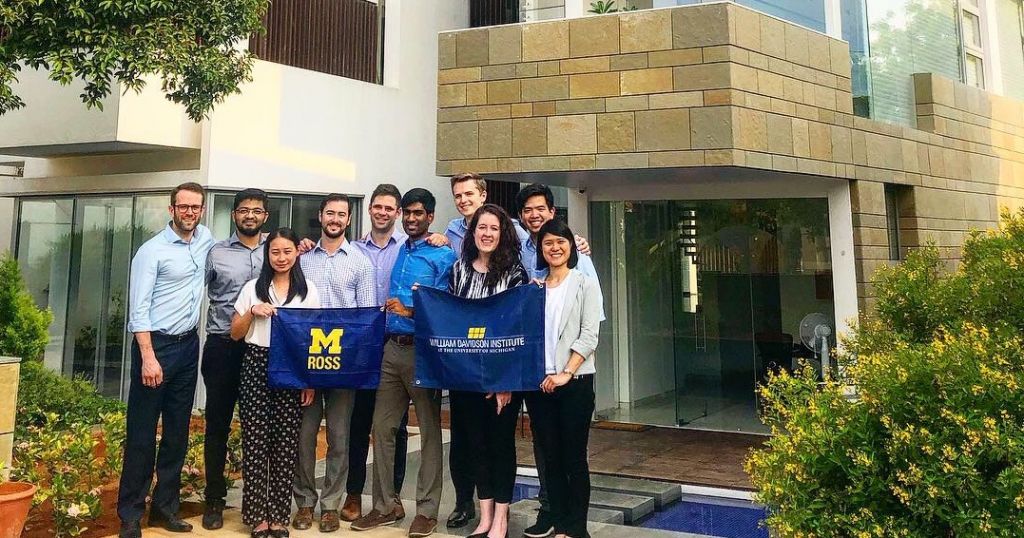Student Perspective: Pioneering Investments in India
Thursday, January 28, 2021
U-M Student Opportunities
Note: WDI supports student learning experiences in a wide variety of projects in low- and middle-income countries. When it comes to developing and investing in small businesses in those regions, WDI projects occasionally intersect with one another. That was the case for Lawrence Chen, who earned his MBA from the Ross Business School at the University of Michigan in 2020. During his Ross MBA program’s Multidisciplinary Action Project (MAP), Chen worked with Poornatha Partnering Entrepreneurs LLP, a small- and medium-sized enterprise (SME) accelerator in Madurai, India – where he developed a growth strategy for the organization. Chen also led financial vehicles research for the International Investment Fund (IIF), a first ever student fund investment fund and MBA-level course, supported by WDI. The team’s assignment focused on a potential investment into one of SMEs in Poornatha’s accelerator program.
Poornatha is the India affiliate of the Michigan Academy for Developing Entrepreneurs (MADE). MADE was founded in 2017 by WDI, the Zell-Lurie Institute at the University of Michigan and Poornatha. MADE provides Entrepreneurship Development Organizations (EDOs) in emerging economies a repeatable, scalable, transferable and profitable service platform to develop entrepreneurs in their home countries.
Additionally, Chen earned the distinction as a Davidson Field Scholar, thanks to his leadership in multiple WDI student projects and affiliated university courses. He provided consulting services to the nonprofit pediatric orthopedic hospital, CURE International in Ethiopia through the WDI-sponsored course, BA685: Healthcare Delivery in Emerging Markets.
In the following blog, Chen shares his experiences working with both the IIF and Poornatha, and what he learned in helping to put together IIF’s first investment deal.
University of Michigan’s International Investment Fund (IIF) was founded to find sustainable ways to fill the financing gap for small and medium-sized enterprises (SMEs) in emerging markets. WDI’s strong partnership with Poornatha, an SME accelerator program in Madurai, led us to identify India as the fund’s first target country. With an SME financing gap of roughly $337 billion in South Asia alone, India was a perfect place to attempt to innovate within the SME investing landscape.
During the last semester of my Ross MBA program, I had the opportunity to lead a team of students to Madurai to conduct due diligence on a potential investment opportunity for IIF. This included research on the company’s management team, financial valuation, market, legal and strategic plan. Additionally, we worked with Michigan Law School’s International Transactions Clinic to draft the University’s first international equity term sheet, a document that will be a springboard for any future deals that IIF leads.

Students involved in the International Investment Fund and MADE. (Image taken prior to COVID-19 outbreak).
Although we decided to initiate investment discussions with our target company, COVID-19 forced us to hold on final negotiations until after the pandemic. Nevertheless, through this project, I learned three valuable lessons that I hope will contribute to the international SME investments discussion:
- Equity investments can be a very touchy subject among SME entrepreneurs in emerging markets. Many of these entrepreneurs are owners of family businesses and want to keep the company within the family for generations to come. So, it is an incredibly personal decision to sell ownership stake in their company. However, equity investments are also necessary for growth since debt in emerging markets can be extremely expensive and can easily lead to insolvency if not kept in check. The most extreme example I heard was from one entrepreneur in Salem, Tamil Nadu, who said that it was not uncommon for business owners in the area to finance debt at a 200% interest rate.
However, it can be difficult for investors to see value in equity investments in emerging market SMEs since these companies are unlikely to IPO or be acquired. So, an equity investor would only realize returns through dividends.
Given these considerations, IIF decided that a preferred equity vehicle with a 5-year clawback agreement was the best way to enable the owners to keep the company in the long-term, while generating returns for the fund. - As infrastructure and regulations in second-tier cities mature, large national and multinational competitors will naturally see more opportunities to enter. For local SME companies to thrive in a more formalized market, they must become competitive before the region matures.
This is a delicate balance for investors to consider. Accelerated formalization means that investors must account for and anticipate significant competitive risk from larger players. Conversely, low formalization can allow for more illicit activities from players who take advantage of a more unstructured system. This makes legally-compliant companies, such as our target, less competitive in the market. - While the relationship between suppliers and customers is extremely transactional in developed countries, this is not true in many emerging markets. It was difficult for our target company to furnish even a single contract for us to evaluate. In Madurai, we found that cultivating strong personal relationships with the people and companies you do business with is critical. When we suggested using contracts to keep better track of accounts receivables, our target’s founders told us that contracts often signal distrust, which can sour a business relationship.
So, the last and perhaps most important lesson I learned was to not assume that best practices in developed countries are applicable for emerging countries. The idea that trust is the most fundamental currency is something I believe we all need to be reminded of more frequently.
I strongly believe that if IIF, WDI, and Poornatha can pioneer successful MSME equity investments in Madurai, we can not only help grow a small handful of companies, but inspire more funds to invest in this severely underfunded sector. I am excited to see what unfolds in the future and am honored to have played a small part in it.

Lawrence Chen is earned his MBA from the Stephen M. Ross School of Business at the University of Michigan in 2020.
